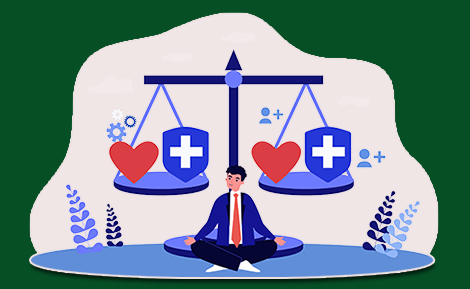In the complicated world of healthcare coverage and insurance, there is a very common question that people ask: Can you have two health insurance plans? This makes people want to discover the possible considerations and benefits of having dual coverage.

Simultaneously having different health insurance quotes can give you increased financial protection and broader benefits. On the other hand, questions about possible overlaps, benefits, and the consequences of claims processing, and medical billing are asked.
In this comprehensive guide, we will be exploring the nuances and benefits of having dual or multiple health insurance coverage. Without delay, let us continue.
Can You Have Two Health Insurance Plans?
Yes, it is 100% possible to have two health insurance policies at the same time. This is referred to as coordination of benefits. This is a process where one of the insurance plans becomes primary and the other secondary. Therefore, you have more coverage for medical expenses and healthcare services.
How Do Two Health Insurance Plans Work Together?
As mentioned earlier, owning two health insurance policies is known as coordination of benefits. This process involves designating one of the health insurance plans as your primary and the other as secondary.
The primary health insurance plan will be responsible for covering any expenses first while the secondary plan might be responsible for covering the remaining cost or expenses. However, this depends on the rules.
With this type of arrangement, you can get enough coverage for any medical expenses while having duplicate benefits and prevent overpayment. People with double coverage need to know how the plan of coordination rules to reduce out-of-pocket costs and file claims smoothly.
Primary and Secondary Insurance Rules
Here are the primary and secondary insurance rules guiding having two or multiple health insurance plans:
| Situation | Primary Insurance | Secondary Insurance |
| You are covered by Medicaid and have employer-sponsored health insurance | Your employer-sponsored plan | Medicaid |
| You are under the age of 26 and have an employer or student health coverage, and you are a dependent on your parent’s insurance plan | Your employer or student plan | Your parent’s plan |
| You have an employer-sponsored health insurance policy and you are a dependent on your partner or spouse’s plan | Your employer-sponsored plan | Your spouse’s employer-sponsored plan |
| You are divorced and your kids are covered by both your insurance plan and your ex-partner’s plan | That of whichever parent has custody of the child. | The new legal partner of the parent |
| You are covered under Medicare and have an employer-sponsored health insurance | Medicare | Your employer |
| Your kids are covered under your health insurance plan and your partner’s health insurance plan | The parent who has the earliest birthday | Parent with the following birthday |
Pros and Cons of Having Multiple Policies
Here are some of the advantages and disadvantages of having two or multiple health insurance quotes:
Pros
- Peace of mind.
- Increased coverage options.
- Flexibility treatment options.
- Employer and spousal coverage.
- Lower out-of-pocket costs.
- Deductible and copayment assistance.
- Increased benefits.
- Access to various healthcare provider networks.
- Dependents coverage.
- Financial protection.
Cons
- Higher premium costs.
- Healthcare provider limitations.
- Coordination issues.
- Additional costs.
- Potential coverage denials.
- Delayed claims processing.
- Limited portability.
- Administrative burden.
- Duplicate or overlap coverage.
- Benefit complexities.
It is important that you evaluate the advantages and disadvantages to find out if it meets your financial situation and healthcare needs.
When Can a Person Have Two Health Insurance Plans?
The answer to when a person can have two health insurance policies depends on the healthcare needs, circumstances, and preferences of the individual. Here are situations where having two health insurance can be beneficial:
- Specialized Coverage
If you have a particular medical condition like cancer therapies or fertility treatments, it is better to have a different insurance policy.
- Restricted Benefits
If one of the insurance plans offers comprehensive coverage, the other insurance plan will have limited benefits that do not improve your overall healthcare coverage.
- COBRA Transition
If you are switching to a part-time position or you lose your job, you can get health insurance from your hirer for up to 18 months because of the Consolidated Omnibus Budget Reconciliation Act (COBRA). Additionally, you can buy a separate plan during this change to make sure that you enjoy continuous coverage when COBRA expires.
- Medicare
Every form of healthcare is not covered by Medicare. For instance, original Medicare does not offer dental care and eye exam coverage. Hence, you can buy supplemental coverage to cover the associated costs.
- Overlapping Coverage
Since both health insurance policies have similar coverage, the benefits will coincide. The services you get from both plans are unnecessary and you will not get extra services from the second plan. For this reason, having two health insurance plans will lead to redundant premium payments.
- Coordination of Benefits
For individuals and their spouses who have employer-sponsored insurance, having two plans will help you mitigate out-of-pocket expenses and additional benefits.
Conclusion
All of these are scenarios where a person can have two or multiple health insurance policies at the same. When you consider the coordination of benefits, make sure that you make use of both insurance plans without overpaying.



